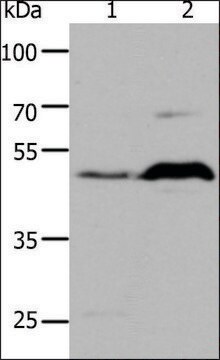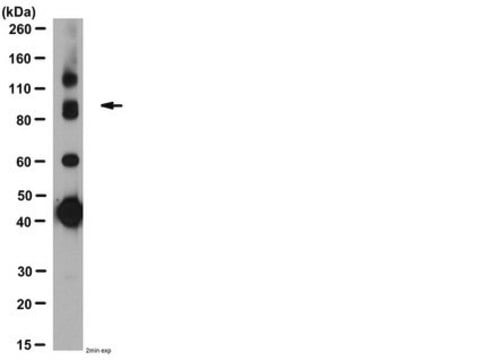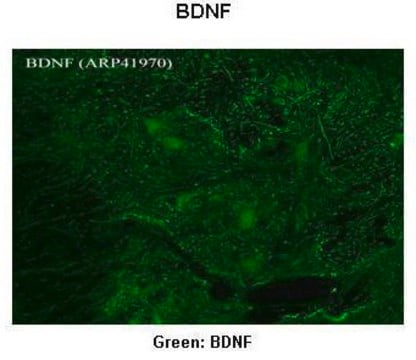AB15350
Anti-Serotonin Receptor 1A Antibody
serum, Chemicon®
Sign Into View Organizational & Contract Pricing
All Photos(1)
About This Item
UNSPSC Code:
12352203
eCl@ss:
32160702
NACRES:
NA.41
Recommended Products
biological source
rabbit
Quality Level
antibody form
serum
antibody product type
primary antibodies
clone
polyclonal
species reactivity
rat
manufacturer/tradename
Chemicon®
technique(s)
immunohistochemistry: suitable
NCBI accession no.
UniProt accession no.
shipped in
dry ice
target post-translational modification
unmodified
Gene Information
rat ... Htr1A(24473)
Specificity
Serotonin Receptor 1A
Immunogen
Synthetic peptide corresponding to a region located in the large third intracellular loop of the rat and mouse 5-HT1A receptor protein.
Application
Anti-Serotonin Receptor 1A Antibody detects level of Serotonin Receptor 1A & has been published & validated for use in IH.
Immunohistochemistry on rat brain: 1:300-1:1,000. Suggested fixative is 4% paraformaldehyde.
Optimal working dilutions must be determined by the end user.
Optimal working dilutions must be determined by the end user.
Legal Information
CHEMICON is a registered trademark of Merck KGaA, Darmstadt, Germany
Not finding the right product?
Try our Product Selector Tool.
Storage Class Code
10 - Combustible liquids
WGK
WGK 1
Flash Point(F)
Not applicable
Flash Point(C)
Not applicable
Certificates of Analysis (COA)
Search for Certificates of Analysis (COA) by entering the products Lot/Batch Number. Lot and Batch Numbers can be found on a product’s label following the words ‘Lot’ or ‘Batch’.
Already Own This Product?
Find documentation for the products that you have recently purchased in the Document Library.
Liang Yang et al.
Brain structure & function, 221(8), 4159-4168 (2015-12-15)
Spinal afferents such as nociceptive afferents and group III-IV muscle afferents are known to exert an acute excitatory effect on breathing when activated. Here, we report the surprising existence of latent spinal afferents which exerted tonic inhibitory influence on breathing
Hung-Ming Chang et al.
Antioxidants (Basel, Switzerland), 10(5) (2021-06-03)
Early-life sleep deprivation (ESD) is a serious condition with severe cognitive sequelae. Considering hippocampus plays an essential role in cognitive regulation, the present study aims to determine whether melatonin, a neuroendocrine beard with significant anti-oxidative activity, would greatly depress the
Inbar Zohar et al.
The European journal of neuroscience, 43(4), 590-600 (2015-12-17)
It is still not clear whether the selective serotonin reuptake inhibitors frequently prescribed to depressed pregnant women improve the behavioural outcome in their children. The current study investigated whether administration of citalopram to pregnant rats could prevent anxiety and depressive-like
Catalina Madarnas et al.
Frontiers in behavioral neuroscience, 14, 92-92 (2020-07-09)
Perinatal ethanol (EtOH) exposure is associated with high incidence of behavioral disorders such as depression and anxiety. The cerebral areas related with these consequences involve the corticolimbic system, in particular the prefrontal cortex, hippocampus, amygdala, and cingulate cortex, although the
Nathalie M Goodfellow et al.
The Journal of neuroscience : the official journal of the Society for Neuroscience, 32(17), 5804-5809 (2012-04-28)
The 5-HT(5A) receptor is the least understood serotonin (5-HT) receptor. Here, we electrophysiologically identify and characterize a native 5-HT(5A) receptor current in acute ex vivo brain slices of adult rodent prefrontal cortex. In the presence of antagonists for the previously
Our team of scientists has experience in all areas of research including Life Science, Material Science, Chemical Synthesis, Chromatography, Analytical and many others.
Contact Technical Service








